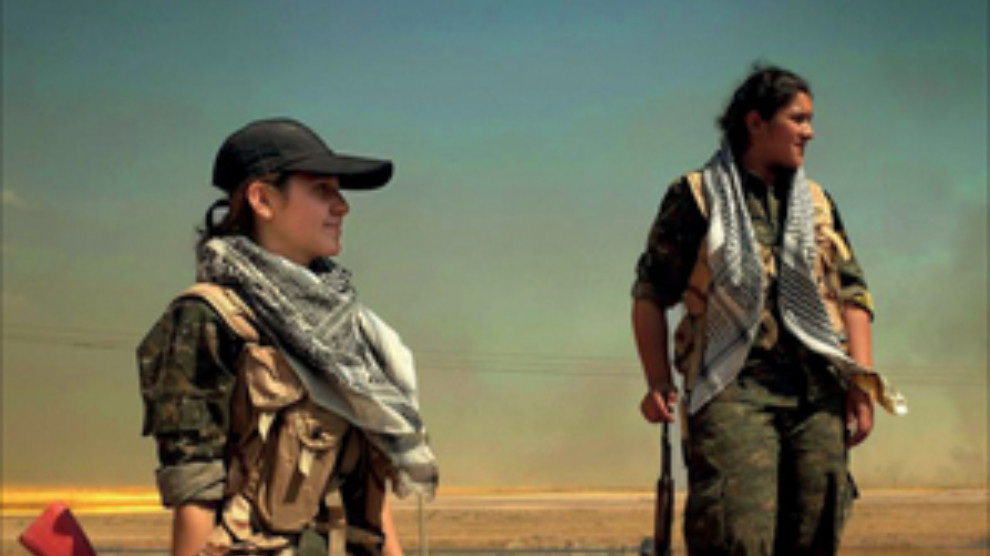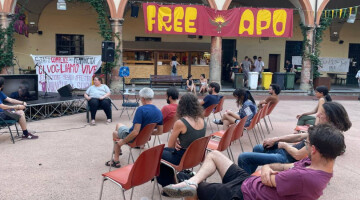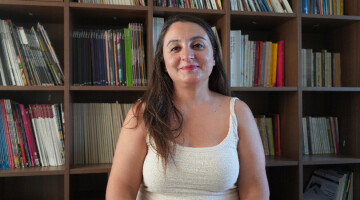The crisis ongoing in Syria for over five years now remains in need of a resolution which some circles are still awaiting from outside.
Kurds in Northern Syria constitute an exception by being the only side among the many others that sought to make a change -which consequently became a leading one- amid the war ruining their lands and lives.
Before the "civil" war in Syria began, the Kurdish population in Northern Syria, historically Rojava (Western) Kurdistan, had long been deprived of all their rights as they were not even accepted as citizens under the 50-year old regime of Damascus which was dominated by one party, one flag, one ideology and one thought.
A change in the Middle East was inevitable as the regimes that disregarded the demands of peoples had to either make changes or be overthrown.
Determined to resist and not surrender in the face of the increasingly continued pressures and attacks with the eruption of the war on Syrian lands, Rojava Kurds didn’t become a part of the powers fighting for power. They chose the third path as they didn’t foresee a change in the short term regarding the war in Syria, and as such, they built a defense system.
Besides defense which was formed by locals taking up arms, they also needed an administrative system so people could get organized. This was done with communes and assemblies at first.
The people therewith started building their own system and social model, Democratic Autonomy, in line with Kurdish People's Leader Abdullah Öcalan's views, in July, 2012. Öcalan had developed the paradigms of democratic modernity and democratic nation in response to capitalist modernity and nation state fascism, respectively.
The project was built by the Movement for Democratic Society (TEV-DEM) and other organizations affiliated to it. The PYD, as the political wing of TEV-DEM, supported this project and gave a struggle to put it into practice. On the way to autonomy, the people in Western Kurdistan formed self-governances and city councils.
Based on the sense of “democratic nation as the unity of diversity”, this system differs from all others because of its structure of organization from the base to the top. This project, which is at the same time a philosophy of life, enables the people to make their own decisions and determine their future and system themselves. The paradigm offers a resolution to the crisis as it bases on a society with the self-governance system as the determining factor.
The Rojava Revolution sparked in 2012 has given birth to a new revolutionary process and proved itself to be a revolution of humanity in every regard. The 19 July Rojava Revolution has created an atmosphere of organisation based on a new consciousness of building a democratic and free life by all social segments. This revolution does also serve a model to the crisis in Syria and the Middle East.
With the Rojava revolution, the Kurdish women also organized themselves in the self defense area as well as social, diplomatic and economic spheres. Women’s Defense Units (YPJ) was developed in the Rojava revolution alongside the People's Defense Units (YPG), became an effective force in all three cantons and answered the attacks from the outside as the authentic women’s organisation. Women organising in both war and life have rewritten women’s history in Rojava, the fortress of resistance.
The revolution proved the possibility that co-existence could be sustained as youths, women and elderly from various ethnic and faith groups joined the resistance side by side.
A new book "Revolution in Rojava: Democratic Autonomy and Women’s Liberation in Syrian Kurdistan" gives a profound insight into the revolutionary act, the following social and political developments until the current situation and the different dimensions of the new society.
The book, written by Michel Knapp, Anja Flach and Ercan Ayboğa from Germany, was published in German in March 2015 after the authors' visit to Rojava in 2014. It was later translated into Spanish and has just been published in English by the British publisher Pluto Press with a translation by Janet Biehl. The Foreword of the book is by David Graeber and the Afterword by Asya Abdullah.
All the three authors have all been actively involved in the Kurdish freedom struggle for many years.
Michel Knapp, originally from radical left-anarchist autonomous movement, had his first experiences with the Kurdish movement in the 1990s.
Anja Flach also got to know the Kurdish women’s movement and traveled to Kurdistan for the first time in the early 1990s.
Ercan Ayboğa, an environmental engineer from North Kurdistan is a leading activist for the Mesopotamian Ecology Movement which was founded in 2011 and has been restructured as a social movement since early 2015. He is a co-founder of the Tatort Kurdistan Campaign in Germany where he lived previously.
Focusing on Social Ecology, Communalism and Ecofeminist Politics, independent writer, editor and translator Janet Biehl worked long years with Murray Bookchin, today's foremost social theorist and political philosopher of the libertarian left. Alongside an international delegation, Biehl also paid a visit to Rojava’s Cezire canton where they learned about the ongoing revolution in early December in 2014.
The introduction of the book reads: "Revolution in Rojava is the first full-length study of this ongoing social and political transformation in Syrian Kurdistan. Its authors draw on their own experiences of working and fighting in the region to construct a picture of hope for Middle Eastern politics and society, and reveal an extraordinary story of a battle against the odds."
The book will be launched in the UK with panel discussions during this week, which are as follows;
CAMBRIDGE // 1ST NOVEMBER // 6 PM
A discussion with co-author Ercan Ayboğa, translator Janel Biehl and activist Dilar Dirik at Cambridge University.
BRIGHTON // 3RD NOVEMBER // 4 PM
Revolutions in Rojava and Beyond: Perspectives on Democratic Transformations
A screening of several short activist-produced films, followed by a panel discussion with speakers Janet Biehl, Ercan Ayboğa and Dilar Dirik.
LONDON // 4TH NOVEMBER // 7 PM
A discussion with co-author Ercan Ayboğa and translator Janel Biehl at the School of Oriental and African Studies (SOAS).
ANF spoke to Ercan Ayboğa, one of the authors of the book, who put emphasis on the crucial role of the Rojava Revolution as a leading force of change in Rojava, Syria and the Middle East.
Today is the World Kobanê Day which symbolizes solidarity with the struggle waged in Rojava's Kobanê town. As is defined by many circles, Kobanê was the resistance of humanity against barbarism and savagery. What made Kobanê differ from other regions under the occupation and attack of ISIS gangs?
The resistance in Kobanê was heroic in fact. For the Kurds and the revolutionaries of Rojava the success was crucial to defend the whole revolutionary project. A defeat in Kobanê would have meant a big step back for Rojava and the Middle East. Today we would not have the strong option of the 3rd and revolutionary-democratic way in Syria. While the most attacked Syrian cities by ISIS could not resist, Kobanê differed with its successfull defend. Kobanê made also the Kurds more known in the world and gave them the attribution of resisting people. This is also related to the fact that thousands of people and the global media has watched from the other side of the border the war in Kobanê.
Kobanê united millions of Kurds in the four occupied states on a level which never happened before. This was historical for the Kurds.
Furthermore Kobanê's success gave to the world the hope to defeat the ISIS which was at that time very strong.
Do you believe the same “sense of being one and together” maintains itself today, after two years?
Among the Kurds yes and no. The most organizations and movements have closer relations, but one party, the PDK (KDP) of Iraq, has started to prefer to work with the Turkish state strategically and against the Rojava revolution. The PDK plays historically a very negative role, also against the Kurdish Freedom Movement in North KUrdistan and South Kurdistan itself. It is the main obstacle for the united stand of the Kurds nowadays. But it could be overcome if the democratic forces of all four parts except PDK work closely together.
The Kobanê resistance became a top agenda around the world during the severest times of ISIS attacks two years ago. This battle for humanity seems forgotten now. Do you think the heroic battle of the Kurdish people -which continues today as well- has received the support it precisely deserves?
No it did not get the support it earns. Many states of this world had two years ago "nice words" for the Kurds, but some months later they started to forgot the Kurds. Also the big press in this world, they started to publish less. And many states and some mainstream press started to accuse the Rojava cantons of committing ethnic cleansing or violating human rights. This shows that the propaganda of the reactionary regional and international powers had affects. Also the propaganda and threats of the Turkish state after the restart of the war in North Kurdistan had its impacts. Nevertheless this is limited as the political project and practice is very democratic. Rojava is the most democratic region of the Middle East which can not be fully ignored.
The states do nothing to break the embargo on Rojava by Turkey and the South Kurdistan which is dominated by the PDK. The approach is shortly: As long as Rojava is useful for us, we can cooperate a little with it and have relations; but we will not give the political legitimacy on international level and will maintain some mechanisms to have tools of repression.
Do you find the self-based reconstruction efforts in Kobanê sufficient? Has the town healed its wounds since and have international circles provided the aid they had promised back then?
Although there are serious reconstruction efforts and projects, it is not enough. The political institutions and structures, public buildings and basic services have been restored mainly; almost all schools have been rehabilitated, the health system works also again and the water and electricity services are even better before the ISIS occupation and destruction. Although all people, who returned to the Kobanê canton, have places to live, still many neighborhoods are in the destructed state. In the reconstruction process several good decisions have been taken, but the principles for a social and ecological reconstruction of buildings, other structures and public areas could have been implemented better. We are aware that there is an embargo and not every material can be founded, but nevertheless more could have been done.
What was your main goal in writing this book? Writing the unwritten history of the Kurdish people or letting the world know what has been going on there?
After the revolution started in Rojava – Western Kurdistan - in 2012 we, as the Tatort Kurdistan Campaign in Germany, had many efforts to get as much information as possible about the new political structures, projects and the characteristics of what was taking place there. Because the information was not enough and in order to get our own picture of the situation of this so important revolution, we decided to send a group of three activists to Rojava. During the preparations of the trip, we discussed not to have articles alone, but to rather produce a book. It was an ambitious project, that is why we used effectively each day of the whole 3 to 5 weeks in Rojava to see everything we could see, to talk with as much people as we could and to try to understand as much as possible what was there in front of our eyes. The field trip in May 2014 was very productive and consequently in March 2015 the book had been published in German. Just afterwards the translations into English started.
The geography of Kurdistan has also suffered a great damage due to the ongoing war, in three parts of Kurdistan; Bakur, Bashur and Rojava. Also as an activist of the ecological struggle in Kurdistan territory, which major problems has this war caused on these lands?
We forget often that war the is one of the main reasons for ecological destruction and exploitation. This is the case again since the war in North Kurdistan (Bakur) has been restarted by the Turkish government in July 2015. Just one week after the start, dozen of forests were burned. The Turkish army torched more than 10.00 hectar forest within 6-7 weeks. In the 90'ies a much larger area was torched, but the intensity was extreme. The same has been repeated in end of June and beginning of July 2016 when major military operations have been carried out. Forests in North Kurdistan are not so much, and as the climate is semi-arid the vulnerability of forests is high. The second big destruction comes from the systematic bombing of the mountains with planes and helicopters. This year was a new record of the bombings of the Turkish state in Bakur and Bashur. Another problem comes from the waste of the military. Furthermore the construction of military stations (there several hundreds - Bakur is one of the most militarized countries of the world) and the roads affect the nature also gravely.
Finally the war leads to the displacement of people. Large areas are depopulated as a result and the traditional agriculture gets lost and with that also the knowledge and skills.
Rojava faces also a huge ecological destruction along the front lines and in the areas (temporarily) occupied by ISIS or other forces - like in Kobanê.
Will the book -which is already available in English and German- be translated into other languages as well?
Yes this year the book has been translated into other languages too. The Italian version has been published already in October 2016 by the publisher Red Star. In the next weeks the book will be published in Russian, Greek and Spanish. The Turkish version will come out within 2-3 months. Now the Arabic translation is undergoing and in the beginning of next year we hope to publish it. The German version of the book was just recently published in its third and updated edition which shows the interest in this book. If the book is published in all these languages than it will accessible to a big part of the world population.
It is important to mention that the translations have been done almost voluntarily. The book has to be considered as a project and a global voice for the revolution of Rojava. Dozens of people have supported the three authors - it is actually the product of a greater group. We will update annually the book as the revolution is progressing and changes happen very fast.















